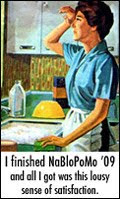
This Lolcat is an example of an Internet meme
An Internet Meme (pronounced "me me") is an Internet-based in-joke, usually with a silly, awkward, or odd basis, which spreads quickly across the Internet.
A meme can be a strange, funny video found online or a combination of images and text. The context ranges from crude to cute (think laughing babies). Memes can also spawn from self-promotion or corporate advertising. However, better known memes are accidental overnight sensations. The meme may often find a home outside the Internet, but in most cases, a meme is picked up by newspapers and nightly news long after the meme has finished its run.
Here's a description from Web site Squidoo, who recently ranked the top 10 memes:
An internet phenomenon or a meme is an image, video, phrase or simply an idea that spreads from one person to another seemingly for no logical reason at all. When people see a meme, no matter how silly it usually is, they find it amusing for one reason or other and forward it to their friends; soon millions of people know about it, thanks to how fast the information can spread online and the viral effect.
I like Wikipedia's definition, so I'll share that too:
At its most basic, an Internet meme is simply the propagation of a digital file or hyperlink from one person to others using methods available through the Internet (for example, email, blogs, social networking sites, instant messaging, etc). The content often consists of a saying or joke, a rumor, an altered or original image, a complete website, a video clip or animation, or an offbeat news story, among many other possibilities. An Internet meme may stay the same or may evolve over time, by chance or through commentary, imitations, and parody versions, or even by collecting news accounts about itself. Internet memes have a tendency to evolve and spread extremely quickly, sometimes going in and out of popularity in just days. They are spread organically, voluntarily, and peer to peer, rather than by compulsion, predetermined path, or completely automated means.
There's not much else to know, really. Old People will likely scratch their head after seeing various contributions to Lolcats, so, Old People, just know it's silly, kind of odd, marginally funny, and an inside joke to the Internet's peoples.
To defense my dismissive attitude, Bobbie Johnson, technology writer for The Guardian, wrote in 2008:
Most internet memes fall into that category - a mixture of context, insanity and peer pressure that creates a snowball that's funny for a bit before becoming ubiquitous and tiresome.
Whew.
Some well-known memes include Lolcats, Courage Wolf, Fred, and Crasher Squirrel. (Old People, I want you to know I didn't know who Fred was, until I saw his face plastered all over stuff at FYE last month.) Check the links below for more lists and examples of popular memes.
Additional Resources:Internet Meme Wikipedia article
List of Internet phenomena Wikipedia article
Know Your Meme, a meme database!
Top 20 YouTube and Video Memes of All Time, Mashable
Top 10 Internet Memes, Squidoo
The Internet and Memetics, Garry Marshall, an apparent academic paper detailing and examining Internet memes
How Boxxy brought the web to its knees, The Guardian
I Can Has Cheez Burger, the Lolcats home page
Lolcat Wikipedia article
Crasher Squirrel Wikipedia article




No comments:
Post a Comment